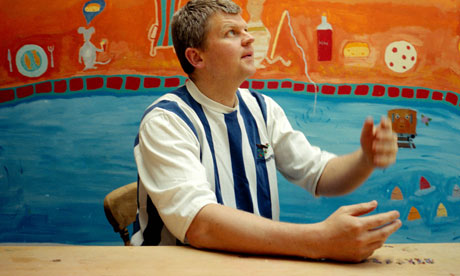
This was the weekend when football's ongoing engagement with issues of race and racial offence went mainstream, pegging itself out – uneasily and, in the end, inconclusively – around an inflammatory Saturday afternoon of FA Cup action on ITV.
Only two things are really certain about English football's current self-policing furore: first that it is unavoidably – and no doubt on some level incorrectly – heartening for those who sat through the monkey-chanting, banana-hurling terraces of the 1980s to hear an entire stand chanting "Racist! Racist!" at an opposition footballer, a 180‑degree rotation in insult‑content that, buried somewhere within its many contradictions, contains some fetid breath of hope for human progress. And second that the whole thing is riven with confusions, both tribal and interpretative. Hopefully these are being worked through a little. If so, ITV's broadcast on Saturday of Manchester United's trip to Liverpool – an incision into the curdled heart of the Suárez‑Evra affair – might be the stuff of deep analysis for future students of football's role in cultural relations.
The match presented ITV with an obvious problem. How do you broadcast around this topic both honestly (because it is so clearly there) and also palatably (because this is, after all football's new world of commercial TV, with its ruling gallery of advertisers and casual viewers)? The uneasiness inherent in bringing such horribly nuanced theatre to the mainstream screen came as early as Adrian Chiles's introductory monologue. "Even more attention on this game today because Patrice Evra is here!" Chiles announced chummily – Chumminess? Really? – over pictures of Evra marching into the ground, the awkward tone capturing exactly the problem of how to linger, but not linger, on these important issues; to make light, but in no way make light, of something nobody feels particularly happy talking about.
Chiles did this well in the end, as you might expect from a man whose default setting of "inoffensive" suddenly seemed pricelessly apt. These big moments should sit a little easier with a man whose career has passed through the broader church of the daytime chat sofa, and who retains even through his current glossed, cufflinked, Chiles 2.0 persona a likeable underdoggish quality reminiscent of a popular local butcher or a junior policeman in a Sunday night detective drama.
ITV had labelled the afternoon A Rivalry Unrivalled, which is, if not the worst title that could be bestowed on an FA Cup fourth‑round tie, then certainly the worst yet. And it was, understandably, an uneven production, coddled in Sky Sports-style doom-laden graphics, given weight by the restrained but nicely persistent questioning of Gabriel Clarke in the stadium, and siphoned rather jarringly through the expert but gurglingly partisan commentary of Clive Tyldesley ("Ji-sung Park SWEEPS in the equaliser!").
In fact the real saving grace of ITV's coverage had very little to do with the dominant subplot and more to do with Chiles's instinct for TV chemistry. Ranged beside him around the lighted coffee table were Paul Ince, Gareth Southgate and Roy Keane, who has at times been an awkward spectacle as a pundit. There has been a blandness to some of Keane's pronouncements that seems completely at odds with the ragingly principled hooligan-philosopher we know him to be. Come on Roy, you keep thinking. Don't bullshit me. I've read your book: I know. There has, though, been progress recently, a suspicion that while talking about banks of four or goals deciding games Keane might be secretly digging a Stanley knife into the palm of his hand under the desk or retreating to the loo in the ad break in order to stare hatefully at himself in the mirror.
Chiles has been working on this and increasingly he seems to bring out glimpses of the real Roy, a burgeoning double act apparently geared along the lines of Eric Morecambe interviewing Hannibal Lecter. "A lot of the players at Liverpool now aren't able to deal with the pressure of playing for Liverpool," Keane intoned mercilessly in response to some prodding by Chiles. "You've got to make your presence felt and go and nail somebody," he suggested later of David de Gea, a goalkeeper who looks more inclined to make his presence felt by writing a poem that he never shows anybody or playing the guitar sulkily in his bedroom; and who in this game was confronted by Liverpool players forming a kind of human conga-wall in front of him, over which he could only peer wistfully like a small boy eyeing next door's apple tree.
Ince, England's first black captain, might have been good given a chance on the main side-issue of the day, but in the end both co-pundits were entirely secondary to the Chiles-Keane chemistry. At least everybody could agree that the game was a success for Andy Carroll, who here was employed by Liverpool as a kind of human missile, in much the same way the carcass of a dead ox might be catapulted beyond the castle walls during a medieval siege.
Keane deserved the last word, though, his ruthless dissection of Evra's culpability for Dirk Kuyt's winning goal bringing a refreshing sense of pure-football honesty to the closing moments. After the fug of conflicting analysis it was strangely refreshing to hear one man quietly butchering another man's abilities and character ("I've seen it from him before in big games, he goes missing") on pure, 100%‑proof footballing grounds. The egalitarianism of a violent but universal meritocracy: this has always been football's most eloquent comment on any of this. Perhaps it will soon be allowed to get back to it.

